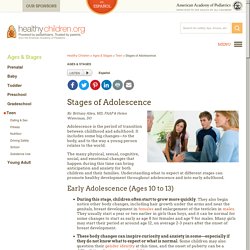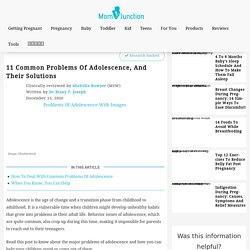

This is the unique period of human development as they begin to experience several developmental milestones such as physical, cognitive and psychosocial development. Here are some useful tips on parenting adolescents. Stages of Adolescence. By: Brittany Allen, MD, FAAP & Helen Waterman, DO Adolescence is the period of transition between childhood and adulthood.

It includes some big changes—to the body, and to the way a young person relates to the world. The many physical, sexual, cognitive, social, and emotional changes that happen during this time can bring anticipation and anxiety for both children and their families. Understanding what to expect at different stages can promote healthy development throughout adolescence and into early adulthood. Early Adolescence (Ages 10 to 13) Dan Siegel - "The Adolescent Brain". 11 Common Problems Of Adolescence, And Their Solutions. Adolescence is the age of change and a transition phase from childhood to adulthood.

It is a vulnerable time when children might develop unhealthy habits that grow into problems in their adult life. Behavior issues of adolescence, which are quite common, also crop up during this time, making it impossible for parents to reach out to their teenagers. Read this post to know about the major problems of adolescence and how you can help your children avoid or come out of them. Erik Erikson's Theory of Psychosocial Development Explained. Adolescent Identity Development: What to Expect in Teens. Adolescent Identity Development: The Factors of Change Among the profound and exciting changes taking place in adolescence is the process of self-discovery. Our teens are working to figure out who they are, making adolescent identity development a central feature of teen life. Young people’s identities are shaped by lots of factors — family, cultural and societal expectations, experiences with institutions like school and the media, and friends.
Young people also take active steps and make choices that shape their identity. 5 Ways You Can Help Your Teen Create a Positive Identity. How Should Parents Address Puberty For Boys and Girls? Communication and the Teenage Brain.